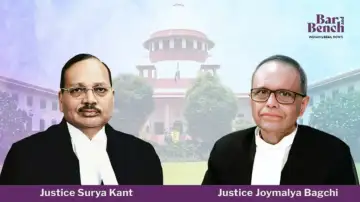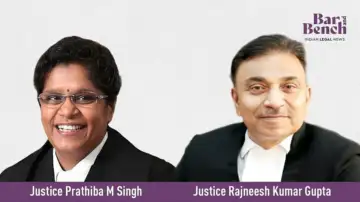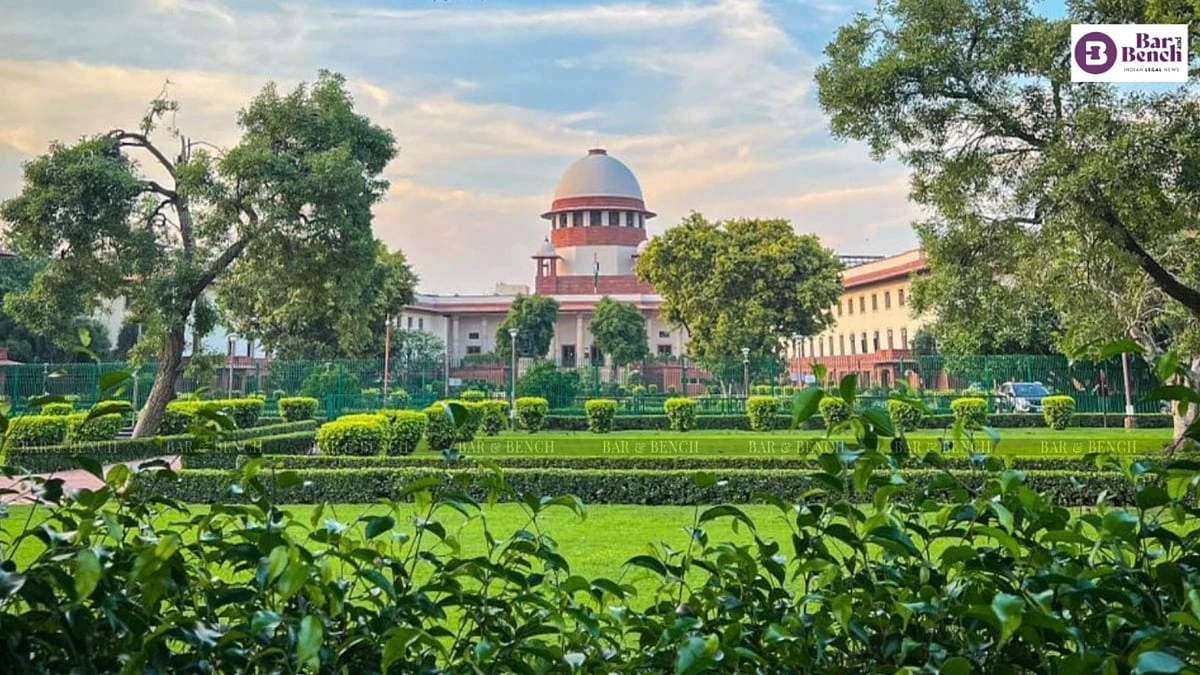The Supreme Court on Monday came down heavily on a businessman, one Nitin Bansal, who had threatened a court-appointed local commissioner with a gun during a judicial inspection in Faridabad [ Nitin Bansal vs. The State of Delhi ].
A Bench of Justices Surya Kant, Ujjal Bhuyan and Joymalya Bagchi refused to grant him any relief against his conviction and jail sentence imposed by the Delhi High Court for criminal contempt of court.
The Court dismissed the plea filed by Bansal against the High Court order sentencing him to one month imprisonment and a fine of ₹2,000 for intimidating a lady lawyer who was appointed local commissioner in his case.
 Justice Surya Kant and Justice Joymalya BagchiThe contempt proceedings stemmed from a dispute over the disposal of 30,000 tonnes of industrial coal involving Bansal’s father, Ashok Bansal. In May 2024, the Delhi High Court restrained Ashok Bansal from dealing with the coal. After allegations of violation, the Court appointed advocate Nandini Bali as a local commissioner to inspect the family’s premises in Faridabad.
Justice Surya Kant and Justice Joymalya BagchiThe contempt proceedings stemmed from a dispute over the disposal of 30,000 tonnes of industrial coal involving Bansal’s father, Ashok Bansal. In May 2024, the Delhi High Court restrained Ashok Bansal from dealing with the coal. After allegations of violation, the Court appointed advocate Nandini Bali as a local commissioner to inspect the family’s premises in Faridabad.
According to Bali’s report, Nitin Bansal arrived during the inspection, behaved aggressively, and placed a pistol on the table to intimidate her and police officers accompanying her. The police later seized the weapon, which turned out to be a real air gun.
A Delhi High Court bench of Justices Prathiba M Singh and Rajneesh Kumar Gupta held that Bansal’s conduct reflected a “deliberate attempt with evil motive” to obstruct the administration of justice and him of criminal contempt under Section 12 of the Contempt of Courts Act, 1971.
The High Court sentenced him to one month’s simple imprisonment and a fine of ₹2,000, with a further 15 days’ imprisonment in default. Though initially ordered to be taken into custody immediately, the High Court allowed him to surrender by November 6, considering that there was a wedding in his family.
Instead of surrendering, Bansal moved the Supreme Court.
 Justice Prathiba M Singh and Justice Rajneesh Kumar GuptaThe Supreme Court made it clear that it found no reason to interfere with the High Court’s findings or show any indulgence to Bansal. It observed that he had displayed no repentance and instead tried to shift blame onto the commissioner.
Justice Prathiba M Singh and Justice Rajneesh Kumar GuptaThe Supreme Court made it clear that it found no reason to interfere with the High Court’s findings or show any indulgence to Bansal. It observed that he had displayed no repentance and instead tried to shift blame onto the commissioner.
Justice Surya Kant rebuked his conduct, saying the High Court had already shown him leniency.
“Before committing all these kinds of nonsense for which the High Court should have taken some harsh action, he has been allowed to go scot free. He has no word of repentance, instead trying to accuse the local commissioner. Telling lies in open court, found to be a dishonest person, then he has the cheek to file this appeal?” Justice Kant said.
Appearing for Bansal, Senior Advocate Shadan Farasat argued that the pistol had been placed on the table even before the inspection began and that the commission proceedings were completed without obstruction.
However, Justice Kant observed that the commission could only be completed because of police intervention.
“Only because of the police intervention the commission could be executed. These five policemen were there and despite that this man could create such a ruckus and scene. Had she gone there bona fide, this man would have done something very serious,” he said.
The Court said that Bansal’s behaviour amounted to grave misconduct against a court-appointed officer.
Justice Kant noted that the commissioner had shown restraint despite being intimidated.
“He misbehaved with a lady lawyer. She has been very magnanimous and grateful about his misconduct. If these kinds of scoundrels are allowed to do this kind of activity…”
Farasat said that Bansal had a speech impediment and may have been misunderstood.
Justice Kant immediately disapproved of that submission, saying.
“Mr Farasat, with your experience, what are you saying?”
At that stage, Justice Bagchi observed that such conduct warranted custody.
“He should be in jail,” Justice Bagchi said.
The Court ultimately refused to interfere with the High Court’s order, observing that there were no grounds to entertain the appeal or the interim prayer.
